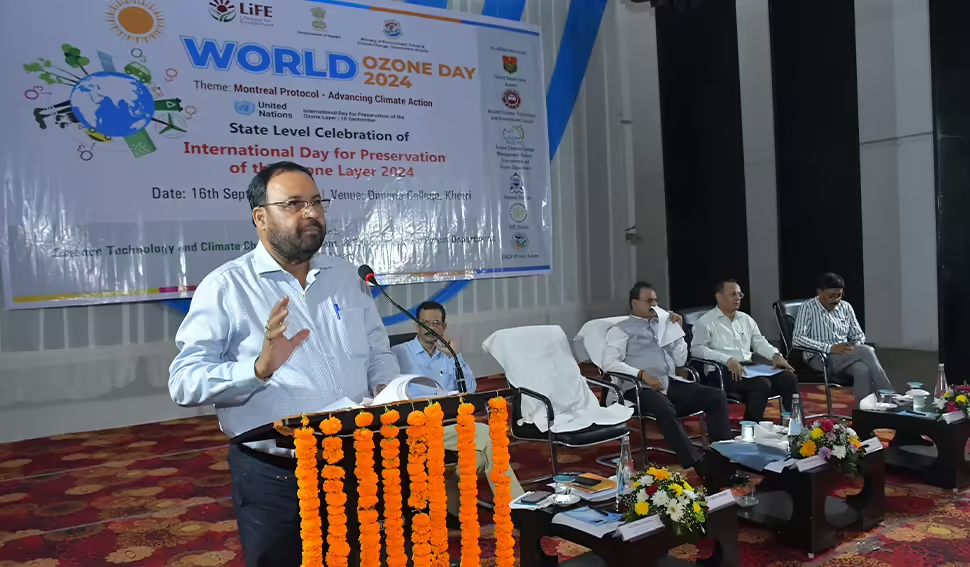Ozone depletion will endanger the survival of biodiversity without prevention: Assam minister

Assam’s Science and Technology and Climate Change Minister Keshab Mahanta on Monday emphasized the critical role of the ozone layer, describing it as a protective shield that covers the stratosphere like an umbrella.
Mahanta noted that the ozone layer is essential for making Earth habitable for humans and all living things by absorbing and blocking harmful ultraviolet rays from reaching the Earth’s surface.
“The second layer of the atmosphere, the ozone layer, which covers the stratosphere like an umbrella, is a protective shield for mankind and all living things in the world. The Earth is habitable for humans and all living things only because the ozone layer in the stratosphere absorbs and prevents the harmful ultraviolet rays from reaching the Earth’s surface,” Assam’s science and technology and climate change minister Keshab Mahanta said on Monday.
Addressing the state level function of World Ozone Day at Demoria College, Mahanta said rapid industrialization has created challenges of environmental pollution and climate change for mankind while also causing massive damage to the ozone layer, posing a serious threat to the survival of humans and the entire fauna.
The programme was organized by the the Department of Science, Technology and Climate Change and Environment and Forests.
“Chemicals such as CFCs and HCFCs emitted from factories and industrial sectors have caused massive damage to the ozone layer in the atmosphere, creating large holes in the ozone layer and increasing the risk of ultraviolet rays reaching the surface,” he said.
“The Montreal Protocol was adopted by the United Nations on September 16, 1987, in Montreal, Canada, where world leaders agreed to take joint emergency measures to prevent the depletion of the ozone layer in the atmosphere,” the minister said.
He said the international community is moving positively towards restoring the ozone layer to 1980 levels by 2040 by firmly implementing the environmental protection protocol, which has been ratified by 198 countries including India.
In his address, Minister of Environment and Forest Chandra Mohan Patowary stressed the pivotal role of the Montreal Protocol in combating climate change and protecting the ozone layer. He emphasized India’s proactive role under Prime Minister Narendra Modi, noting that the country stands united with the global community in its fight against global warming.
Patowary highlighted Assam’s initiatives under the leadership of Chief Minister Himanta Biswa Sarma to preserve nature and expand the state’s green coverage. He appreciated the enthusiastic participation of students, calling their involvement inspiring. “We must leave a better and greener future for them,” he remarked, urging collective action to safeguard the environment.
He also explained that the Montreal Protocol, signed in 1987, was designed to phase out substances that deplete the ozone layer, which serves as Earth’s protective shield against harmful ultraviolet radiation.
Patowary appealed for continued public cooperation, encouraging people to reduce the use of ozone-depleting chemicals like CFCs, plant more trees, conserve energy, and promote eco-friendly practices. “Together, we can build a healthier, safer, and more sustainable world,” he added.
The minister further noted that scientific studies predict the ozone layer could recover to its 1980 levels by 2040-2066 due to global efforts.
Additional Principal Chief Conservator of Forests Dr Satyendra Singh, senior advisor to Assam Climate Change Management Committee Rizwan Uz Zaman, Director of Assam Council of Science Technology and Environment (ASTEC) Dr Jaydeep Barua and acting principal of Demoria College Manabjyoti Barkatki also participated in the state level world Ozone Day programme.
Dr Abhinandan Shaikia of Tata Institute of Social Sciences, Dr Rahul Mohanta of Cotton College and Mashfiq Hazarika of the International Institute of Wildlife Research were the keynote speakers on climate action, sustainable development and global initiatives to protect the ozone layer.
The day was marked by thematic lectures, poster drawing competitions and tree planting programmes. The Department of Science, Technology and Climate Change (DSTC) of the state government also conducted awareness programs on the India Cooling Action Plan 2024 and planted trees through Eco-Clubs and Science Cells of colleges at the district level.
In addition, a programme on technology was held in the presence of experts from various institutions.

Leave a Reply